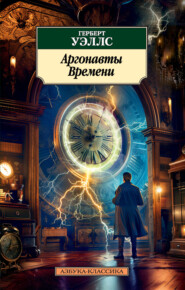По всем вопросам обращайтесь на: info@litportal.ru
(©) 2003-2024.
✖
Tales of Space and Time
Настройки чтения
Размер шрифта
Высота строк
Поля
"But … What do you mean?"
"There was a time when there were no houses in the world; when all mankind slept always in the open air."
"But for us! The emptiness! No walls – no ceiling!"
"Dear," he said, "in London you have many beautiful ceilings. Artists paint them and stud them with lights. But I have seen a ceiling more beautiful than any in London…"
"But where?"
"It is the ceiling under which we two would be alone…"
"You mean…?"
"Dear," he said, "it is something the world has forgotten. It is Heaven and all the host of stars."
Each time they talked the thing seemed more possible and more desirable to them. In a week or so it was quite possible. Another week, and it was the inevitable thing they had to do. A great enthusiasm for the country seized hold of them and possessed them. The sordid tumult of the town, they said, overwhelmed them. They marvelled that this simple way out of their troubles had never come upon them before.
One morning near Midsummer-day, there was a new minor official upon the flying stage, and Denton's place was to know him no more.
Our two young people had secretly married, and were going forth manfully out of the city in which they and their ancestors before them had lived all their days. She wore a new dress of white cut in an old-fashioned pattern, and he had a bundle of provisions strapped athwart his back, and in his hand he carried – rather shame-facedly it is true, and under his purple cloak – an implement of archaic form, a cross-hilted thing of tempered steel.
Imagine that going forth! In their days the sprawling suburbs of Victorian times with their vile roads, petty houses, foolish little gardens of shrub and geranium, and all their futile, pretentious privacies, had disappeared: the towering buildings of the new age, the mechanical ways, the electric and water mains, all came to an end together, like a wall, like a cliff, near four hundred feet in height, abrupt and sheer. All about the city spread the carrot, swede, and turnip fields of the Food Company, vegetables that were the basis of a thousand varied foods, and weeds and hedgerow tangles had been utterly extirpated. The incessant expense of weeding that went on year after year in the petty, wasteful and barbaric farming of the ancient days, the Food Company had economised for ever more by a campaign of extermination. Here and there, however, neat rows of bramble standards and apple trees with whitewashed stems, intersected the fields, and at places groups of gigantic teazles reared their favoured spikes. Here and there huge agricultural machines hunched under waterproof covers. The mingled waters of the Wey and Mole and Wandle ran in rectangular channels; and wherever a gentle elevation of the ground permitted a fountain of deodorised sewage distributed its benefits athwart the land and made a rainbow of the sunlight.
By a great archway in that enormous city wall emerged the Eadhamite road to Portsmouth, swarming in the morning sunshine with an enormous traffic bearing the blue-clad servants of the Food Company to their toil. A rushing traffic, beside which they seemed two scarce-moving dots. Along the outer tracks hummed and rattled the tardy little old-fashioned motors of such as had duties within twenty miles or so of the city; the inner ways were filled with vaster mechanisms – swift monocycles bearing a score of men, lank multicycles, quadricycles sagging with heavy loads, empty gigantic produce carts that would come back again filled before the sun was setting, all with throbbing engines and noiseless wheels and a perpetual wild melody of horns and gongs.
Along the very verge of the outermost way our young people went in silence, newly wed and oddly shy of one another's company. Many were the things shouted to them as they tramped along, for in 2100 a foot-passenger on an English road was almost as strange a sight as a motor car would have been in 1800. But they went on with steadfast eyes into the country, paying no heed to such cries.
Before them in the south rose the Downs, blue at first, and as they came nearer changing to green, surmounted by the row of gigantic wind-wheels that supplemented the wind-wheels upon the roof-spaces of the city, and broken and restless with the long morning shadows of those whirling vanes. By midday they had come so near that they could see here and there little patches of pallid dots – the sheep the Meat Department of the Food Company owned. In another hour they had passed the clay and the root crops and the single fence that hedged them in, and the prohibition against trespass no longer held: the levelled roadway plunged into a cutting with all its traffic, and they could leave it and walk over the greensward and up the open hillside.
Never had these children of the latter days been together in such a lonely place.
They were both very hungry and footsore – for walking was a rare exercise – and presently they sat down on the weedless, close-cropped grass, and looked back for the first time at the city from which they had come, shining wide and splendid in the blue haze of the valley of the Thames. Elizabeth was a little afraid of the unenclosed sheep away up the slope – she had never been near big unrestrained animals before – but Denton reassured her. And overhead a white-winged bird circled in the blue.
They talked but little until they had eaten, and then their tongues were loosened. He spoke of the happiness that was now certainly theirs, of the folly of not breaking sooner out of that magnificent prison of latter-day life, of the old romantic days that had passed from the world for ever. And then he became boastful. He took up the sword that lay on the ground beside him, and she took it from his hand and ran a tremulous finger along the blade.
"And you could," she said, "you– could raise this and strike a man?"
"Why not? If there were need."
"But," she said, "it seems so horrible. It would slash… There would be" – her voice sank, – "blood."
"In the old romances you have read often enough …"
"Oh, I know: in those – yes. But that is different. One knows it is not blood, but just a sort of red ink… And you– killing!"
She looked at him doubtfully, and then handed him back the sword.
After they had rested and eaten, they rose up and went on their way towards the hills. They passed quite close to a huge flock of sheep, who stared and bleated at their unaccustomed figures. She had never seen sheep before, and she shivered to think such gentle things must needs be slain for food. A sheep-dog barked from a distance, and then a shepherd appeared amidst the supports of the wind-wheels, and came down towards them.
When he drew near he called out asking whither they were going.
Denton hesitated, and told him briefly that they sought some ruined house among the Downs, in which they might live together. He tried to speak in an off-hand manner, as though it was a usual thing to do. The man stared incredulously.
"Have you done anything?" he asked.
"Nothing," said Denton. "Only we don't want to live in a city any longer. Why should we live in cities?"
The shepherd stared more incredulously than ever. "You can't live here," he said.
"We mean to try."
The shepherd stared from one to the other. "You'll go back to-morrow," he said. "It looks pleasant enough in the sunlight… Are you sure you've done nothing? We shepherds are not such great friends of the police."
Denton looked at him steadfastly. "No," he said. "But we are too poor to live in the city, and we can't bear the thought of wearing clothes of blue canvas and doing drudgery. We are going to live a simple life here, like the people of old."
The shepherd was a bearded man with a thoughtful face. He glanced at Elizabeth's fragile beauty.
"They had simple minds," he said.
"So have we," said Denton.
The shepherd smiled.
"If you go along here," he said, "along the crest beneath the wind-wheels, you will see a heap of mounds and ruins on your right-hand side. That was once a town called Epsom. There are no houses there, and the bricks have been used for a sheep pen. Go on, and another heap on the edge of the root-land is Leatherhead; and then the hill turns away along the border of a valley, and there are woods of beech. Keep along the crest. You will come to quite wild places. In some parts, in spite of all the weeding that is done, ferns and bluebells and other such useless plants are growing still. And through it all underneath the wind-wheels runs a straight lane paved with stones, a roadway of the Romans two thousand years old. Go to the right of that, down into the valley and follow it along by the banks of the river. You come presently to a street of houses, many with the roofs still sound upon them. There you may find shelter."
They thanked him.
"But it's a quiet place. There is no light after dark there, and I have heard tell of robbers. It is lonely. Nothing happens there. The phonographs of the story-tellers, the kinematograph entertainments, the news machines – none of them are to be found there. If you are hungry there is no food, if you are ill no doctor …" He stopped.
"We shall try it," said Denton, moving to go on. Then a thought struck him, and he made an agreement with the shepherd, and learnt where they might find him, to buy and bring them anything of which they stood in need, out of the city.
And in the evening they came to the deserted village, with its houses that seemed so small and odd to them: they found it golden in the glory of the sunset, and desolate and still. They went from one deserted house to another, marvelling at their quaint simplicity, and debating which they should choose. And at last, in a sunlit corner of a room that had lost its outer wall, they came upon a wild flower, a little flower of blue that the weeders of the Food Company had overlooked.
That house they decided upon; but they did not remain in it long that night, because they were resolved to feast upon nature. And moreover the houses became very gaunt and shadowy after the sunlight had faded out of the sky. So after they had rested a little time they went to the crest of the hill again to see with their own eyes the silence of heaven set with stars, about which the old poets had had so many things to tell. It was a wonderful sight, and Denton talked like the stars, and when they went down the hill at last the sky was pale with dawn. They slept but little, and in the morning when they woke a thrush was singing in a tree.
So these young people of the twenty-second century began their exile. That morning they were very busy exploring the resources of this new home in which they were going to live the simple life. They did not explore very fast or very far, because they went everywhere hand-in-hand; but they found the beginnings of some furniture. Beyond the village was a store of winter fodder for the sheep of the Food Company, and Denton dragged great armfuls to the house to make a bed; and in several of the houses were old fungus-eaten chairs and tables – rough, barbaric, clumsy furniture, it seemed to them, and made of wood. They repeated many of the things they had said on the previous day, and towards evening they found another flower, a harebell. In the late afternoon some Company shepherds went down the river valley riding on a big multicycle; but they hid from them, because their presence, Elizabeth said, seemed to spoil the romance of this old-world place altogether.
In this fashion they lived a week. For all that week the days were cloudless, and the nights nights of starry glory, that were invaded each a little more by a crescent moon.
Yet something of the first splendour of their coming faded – faded imperceptibly day after day; Denton's eloquence became fitful, and lacked fresh topics of inspiration; the fatigue of their long march from London told in a certain stiffness of the limbs, and each suffered from a slight unaccountable cold. Moreover, Denton became aware of unoccupied time. In one place among the carelessly heaped lumber of the old times he found a rust-eaten spade, and with this he made a fitful attack on the razed and grass-grown garden – though he had nothing to plant or sow. He returned to Elizabeth with a sweat-streaming face, after half an hour of such work.
"There were giants in those days," he said, not understanding what wont and training will do. And their walk that day led them along the hills until they could see the city shimmering far away in the valley. "I wonder how things are going on there," he said.
And then came a change in the weather. "Come out and see the clouds," she cried; and behold! they were a sombre purple in the north and east, streaming up to ragged edges at the zenith. And as they went up the hill these hurrying streamers blotted out the sunset. Suddenly the wind set the beech-trees swaying and whispering, and Elizabeth shivered. And then far away the lightning flashed, flashed like a sword that is drawn suddenly, and the distant thunder marched about the sky, and even as they stood astonished, pattering upon them came the first headlong raindrops of the storm. In an instant the last streak of sunset was hidden by a falling curtain of hail, and the lightning flashed again, and the voice of the thunder roared louder, and all about them the world scowled dark and strange.
Seizing hands, these children of the city ran down the hill to their home, in infinite astonishment. And ere they reached it, Elizabeth was weeping with dismay, and the darkling ground about them was white and brittle and active with the pelting hail.
Then began a strange and terrible night for them. For the first time in their civilised lives they were in absolute darkness; they were wet and cold and shivering, all about them hissed the hail, and through the long neglected ceilings of the derelict home came noisy spouts of water and formed pools and rivulets on the creaking floors. As the gusts of the storm struck the worn-out building, it groaned and shuddered, and now a mass of plaster from the wall would slide and smash, and now some loosened tile would rattle down the roof and crash into the empty greenhouse below. Elizabeth shuddered, and was still; Denton wrapped his gay and flimsy city cloak about her, and so they crouched in the darkness. And ever the thunder broke louder and nearer, and ever more lurid flashed the lightning, jerking into a momentary gaunt clearness the steaming, dripping room in which they sheltered.

















